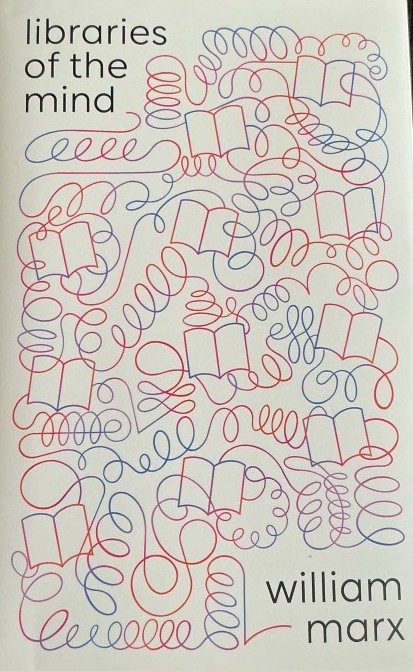Inspiring Older Readers
 posted on 27 Jul 2025
posted on 27 Jul 2025
Libraries of the Mind by William Marx
I’ve been reading and collecting books for more years than I find comfortable to contemplate and my house is now covered floor to ceiling with shelves that house the ever-growing, ever evolving accumulation. Visitors are often flummoxed by why it is that I spend so much time and effort storing and looking after books once I’ve read them and I sometimes have difficulty articulating why it is that keeping them is so important to me: yes, I do want to read them more than once: yes, I do love them as objects of art in their own, aesthetic right: but, yes, I somehow believe that these books represent a sort of ‘road-map’ to my own personal intellectual development over the years. I’d like to believe that someone looking at these shelves would have a crude but (hopefully) fascinating insight into the ideas that have shaped me over the years.
As you might be able to tell from what I’ve just written, it’s sometimes a bit of a struggle to clearly articulate this latter idea – until, that is I had the good fortune to read Libraries of the Mind by William Marx. So, what are the origins of this compact little book – only 150 pocket-sized pages long? Helpfully the author tells us:
“This book originates from the Princeton University Press Lectures in European History and Culture I gave at Oxford University in the beautiful Levine auditorium of Trinity College…”
Marx starts with reference to the extraordinary classic, Erich Auerbach’s Mimesis – an overview of Western literary culture that scared me half to death when I found it on my first university reading list back in 1972. This astonishing piece of post-war scholarship was written by the author without the use of research libraries: in other words, it was written by drawing on what you might call Auerbach’s own ‘library of the mind’.
From this jumping off point, Marx goes on to deconstruct the social and cultural ideas that underpin the creation of physical libraries and their role in convincing us – through their methods of classification – that there is a sort of hierarchy of knowledge that shapes how we think and how we value what we see, read and hear.
He then sets these physical libraries against what we can think of as our libraries of the mind – the rich accumulation of ‘reading’ that we have undertaken and absorbed. The ‘shelves’ of our mental libraries are – or can be – far more complex and exciting than those of the physical library. We create a matrix of relationships between the ideas we encounter very much more like the way the virtual cataloguing of Wikipedia can achieve.
But, Marx warns, there is always a tendency for libraries of the mind to stay confined to those ideas we are comfortable with – that we are reluctant to break out of the ways of thinking that we are most at home with. Using a metaphor borrowed from astronomy, Marx wants us to engage with the ‘dak matter’ of literature – the stuff we can deduce is there but is outside our usual choice or experience: it's the literature we know must be out there but have no idea how to access. He also wants us, as readers seeking to expand our libraries of the mind, to develop a ‘world library’ and ‘that true engagement with literature demands humility, openness, and a readiness to be transformed by the unkown..’
As I indicted at the outset, this is a relatively short read but it’s one that’s absolutely packed solid with provocative ideas that will, I hope, offer you new ways of thinking and articulating the way you think of reading and storing what you’ve learned from your adventures with literature.
Published by Princeton University Press, you will be able to get a copy from your local independent bookshop – who will, of course, be happy to order it for you if they don’t have it on their shelves.
Terry Potter
July 2025